
Imre Kozma (4 June 1940 – 17 October 2024) was a Hungarian Roman Catholic priest, the founder of the Hungarian Charity Service of the Sovereign Military Order of Malta, patron of East German refugees arriving to Hungary in 1988–89.

Imre Kozma (4 June 1940 – 17 October 2024) was a Hungarian Roman Catholic priest, the founder of the Hungarian Charity Service of the Sovereign Military Order of Malta, patron of East German refugees arriving to Hungary in 1988–89.
Imre Kozma was born in 1940 in Győrzámoly. His father died in a train accident in 1941 and he was raised by his mother and grandmother. He completed his secondary education in 1958 at Czuczor Gergely Benedictine Secondary School. Subsequently he studied theology at the Esztergom Seminary. He was ordained as a priest in 1963; first he became the curate of Tát and Dorog, then he served at the Holy Family Parish in Zugliget (Budapest) from 1966 to 1968. He served at the Church of Saint Peter of Alcantara, better known as the Franciscan Church of Pest from 1968 until 1977. Subsequently he returned to Zugliget, where he arranged a regular youth and family pastoral care. He organized an unprecedented system of charitable activities in the parish, manned chiefly by his youth group. He served in Zugliget until 1997.
In 1987 he was approached by the Hungarian association-in-exile of the Sovereign Military Order of Malta, then operating mostly from West Germany, which was looking for ways to start charitable activities openly inside Hungary. He thus came into contact with Baroness Csilla von Boeselager, who was the leading organisator of humanitarian shipments sent by the Order of Malta from West Germany to Hungary. Together, they quickly built up a powerful network of distribution of aid to needy persons within Hungary and to refugees from Romania. The need for a dedicated civil society organisation quickly became apparent. Due to the fact that organisations of that kind were not allowed in Hungary in the 1980’s, Csilla von Boeselager established the charity service in Germany as Ungarischer Malteser Caritas-Dienst. In 1989, as legal obstacles ceased to exist, the Hungarian Charity Service of the Order of Malta was founded, and Father Kozma became a member of the Sovereign Military Order of Malta. [1]
On 13 August 1989, after celebrating his Sunday Mass, he was asked by the consul of West Germany in Budapest to help accommodate and take care of the East German refugees, who were flooding into Hungary and thus, paralysing the embassy’s work. Kozma agreed to that without the slightest hesitation. As he said it later: "A medieval interpretation of the church has come to life again: Shelter". Refugees from East Germany were accommodated by the Parish in Zugliget from 14 August. That very evening nearly a thousand people were sheltered but the following months a series of new sanctuaries provided for almost 48,600 people altogether. The consulate of West Germany even moved to the garden of the parish for a time, to issue West German travel documents to the refugees - a politically highly delicate and dangerous act, made possible only by the chaotic situation in mid-1989. These events captured the attention of the leadership of East Germany as well; a list of 101 people was compiled of people they were planning to take to the International Court of Justice, with Imre Kozma in the lead, for helping those who violated the laws of "Sovereign East Germany". [2]
The Hungarian Charity Service of the Order of Malta was facing another humanitarian crisis in December, at the time of the Romanian revolution; then they gathered twenty-two truckloads of donations and transported them to Transylvania. At the time of the Yugoslav Wars in the 1990s Father Kozma managed to convince the Serbian commander of Vukovar to let those elderly and young, who were trapped in the city, to flee to Hungary. Since then, the Charity service has built a countrywide network and it is one of the biggest charity services of Hungary. Kozma joined the Order of Brothers Hospitallers of Saint John of God ("Barmherzige Brüder"), [3] taking his vows in 1999; later he became the preceptor in Budapest. He arranged the reintroduction of the Order in Hungary and successfully reclaimed their hospitals in Vác and Budapest in 2000.
Acknowledgements: He was acknowledged in many ways for his humanitarian efforts in Hungary and abroad as well.
Kozma died on 17 October 2024, at the age of 84. [7]
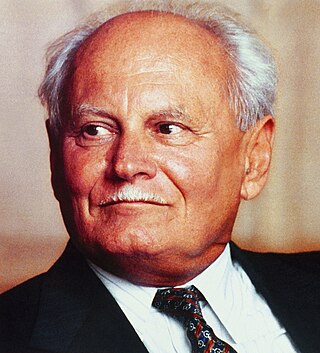
Árpád Göncz was a Hungarian writer, translator, lawyer, agronomist, and liberal politician who served as President of Hungary from 2 May 1990 to 4 August 2000. Göncz played a role in the Hungarian Revolution of 1956, for which he was imprisoned for six years. After his release, he worked as a translator of English-language literary works.

George Szirtes is a British poet and translator from the Hungarian language into English. Originally from Hungary, he has lived in the United Kingdom for most of his life after coming to the country as a refugee at the age of eight. Szirtes was a judge for the 2017 Griffin Poetry Prize.

László Sólyom was a Hungarian politician, lawyer, and librarian who was President of Hungary from 2005 until 2010. Previously he was the first president of the Constitutional Court of Hungary from 1990 to 1998.

Dorog is a small town in Komárom-Esztergom County, Hungary. It lies 38 km (24 mi) north-west from the center of Budapest.

The Boeselagerfamily is an old German noble family that originated from Magdeburg.
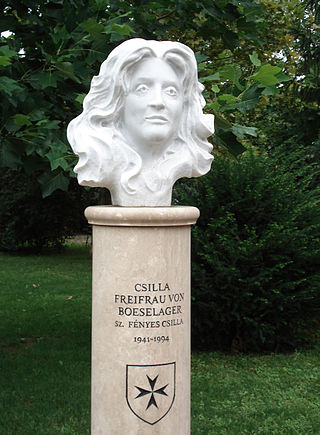
Csilla von Boeselager was a Baroness who founded the Hungarian Maltese Charity Organisation in Germany, and initiated the foundation of the Magyar Máltai Szeretetszolgálat (MMSz) in Hungary. She was a Dame of Malta.
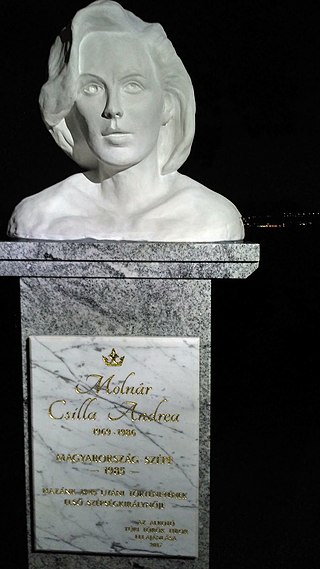
Csilla Andrea Molnár was a Hungarian beauty queen. She was crowned Miss Hungary on 5 October 1985, in Budapest, the first Hungarian beauty queen after a 50-year interval. She also entered for the Miss Europa 1986 beauty contest in Malta, where she came in third place.

Dames of Malta are female members of the Sovereign Military Order of Malta. The male counterparts of these Dames are the Knights of Malta.

Malteser International is an international non-governmental aid agency for humanitarian aid of the Sovereign Military Order of Malta. Developed in 2005 from the foreign aid service of Malteser Germany, and having the status of an independent eingetragener Verein since 2013, the agency has more than 50 years of experience in humanitarian relief. It currently implements around 100 projects in some 30 countries in Africa, Asia, Europe, Middle East and the Americas. The organization's General Secretariat is located in Cologne, Germany with regional headquarters for Europe and the Americas located in Cologne and New York City respectively. The membership of Malteser International consists of 27 national associations and priories of the Sovereign Military Order of Malta, who are responsible for supporting the organization within their jurisdictions.

The Pan-European Picnic was a peace demonstration held on the Austrian-Hungarian border near Sopron, Hungary on 19 August 1989. The opening of the border gate between Austria and Hungary at the Pan-European Picnic was an event in the chain reaction, at the end of which Germany reunified, the Iron Curtain fell apart, and the Eastern Bloc disintegrated. The communist governments and the Warsaw Pact subsequently dissolved, ending the Cold War.
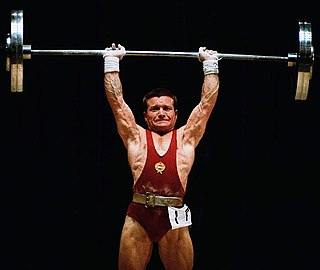
Imre Földi was a Hungarian weightlifter. Competing at a record of five Olympic Games, he won a gold medal in 1972 and silver medals in 1964 and 1968.
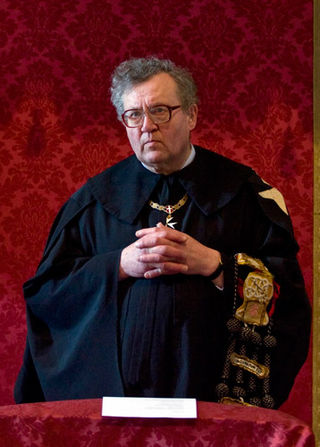
Fra' Robert Matthew Festing GCStJ OBE TD DL was an English Roman Catholic official who was the Prince and Grand Master of the Sovereign Military Order of Malta from 2008 until his resignation on 28 January 2017, following a dispute with the Vatican.
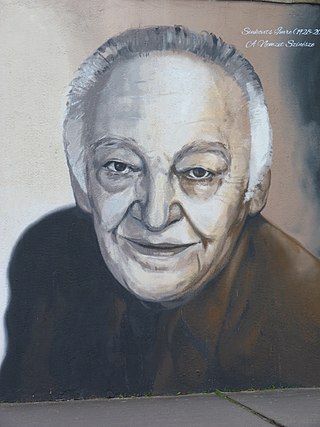
Imre Sinkovits was a Hungarian actor.
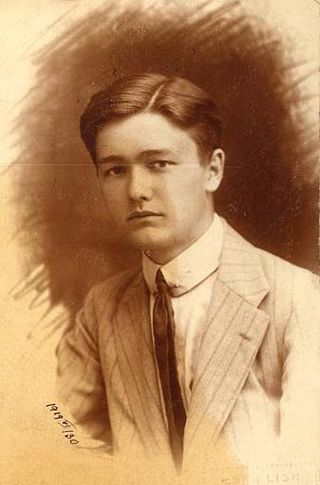
László Németh was a Hungarian dentist, writer, dramatist and essayist. He was born in Nagybánya the son of József Németh (1873–1946) and Vilma Gaál (1879–1957). Over the Christmas of 1925, he married Ella Démusz (1905–1989), the daughter of János Démusz, a keeper of a public house. Between 1926 and 1944 they had six daughters, but two of them died in infancy. In 1959 he visited the Soviet Union. In the last part of his life he lived and worked in Tihany. He died from a stroke on 3 March 1975 in Budapest and was buried in Farkasréti Cemetery, Budapest, where he shares a grave with his wife.

Péter János Zwack was a Hungarian businessman, investor, philanthropist, diplomat and the Hungarian Ambassador to the United States from 1990 until 1991. He was the CEO and owner of the company Zwack.
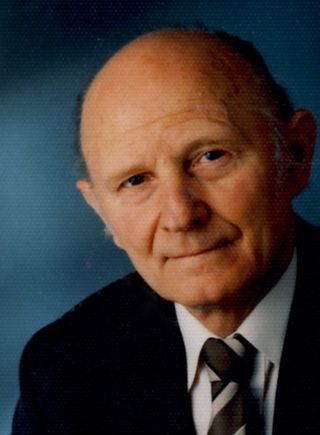
Imre (Emmerich) Menyhay was a Hungarian-Austrian economist, pedagogue, sociologist, and psychologist of economics. His fields of research are pedagogy, economic psychology, and economic sociology development. His key works are Management, Business, Ethics - Social Theory and Background by the Application of Economic Sociology, dealing with social theoretical economic sociology, and Homo Oeconomicus And Unfinished Creation - The Analytical Background by Economic Psychology and Its Application, dealing with psychoanalytical economic psychology.
André Libik is a film producer, director and writer. After World War 2 his father Albert Libik, who was an influential businessman in Budapest, sent him to an elite boarding school located in Switzerland. Returning to Budapest, first he studied chemistry upon the wish of his father and older brother George Libik, but later enrolled in the Hungarian Film School. He left Hungary in 1956, after the Hungarian Revolution. He settled in Paris with his wife and two daughters as a refugee. There he directed his first films for the French Red Cross, unpaid. After his successful application as Head of the Film Division in the Nigerian Ministry of Information, he lived in Africa for three years and produced films, one of which won the Silver Bear Award at the Berlin Film Festival. In 1963 he moved to Germany and worked for television, established his own film production company, creating many documentaries, TV and feature films. He was awarded the “Grimme-Preis”, the top German TV award. In 1992, he settled in Hungary again, continued to produce films and won the “Golden Butterfly Award”.

Olga Máté was one of the first women Hungarian photographers, most known for her portraits. She was known for her lighting techniques and used lighted backgrounds to enhance her portraits and still life compositions. In 1912 she won a gold medal in Stuttgart at an international photography exhibit. Perhaps her best-known images are portraits she took of Mihály Babits and Margit Kaffka. She was also an early suffragist in Hungary and during the Hungarian White Terror assisted several intellectuals in their escapes.
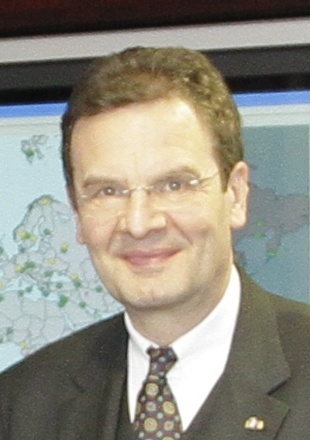
Albrecht Freiherr von Boeselager is a German lawyer and forester and was formerly a member of the Sovereign Council of the Sovereign Military Order of Malta. He served as Grand Hospitaller from 1989 to 2014, and from 2014 until September 3rd, 2022 as its grand chancellor. Boeselager was at the centre of a leadership controversy within the Order of Malta in late 2016 and early 2017. After Boeslager was suspended as grand chancellor, Pope Francis intervened to restore him to office and require the resignation of the prince and grand master of the order, Matthew Festing. Pope Francis dissolved the Sovereign Council on September 3, 2022, and appointed H.E. Ricardo Paternò di Montecupo as grand chancellor.
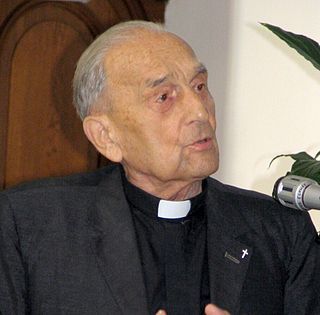
Dr OSB Placid Olofsson was a Hungarian Benedictine monk, priest, teacher and Gulag victim.